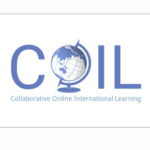Collaborative Online Intercultural Learning
 |
Collaborative Online Intercultural Learning |
COIL, also referred to as globally networked learning and virtual exchange, is a new teaching and learning paradigm that promotes the development of intercultural competence across shared multicultural learning environments.
Through the use of Internet – based tools and innovative online pedagogies, COIL fosters meaningful exchanges between university-level teachers and students with peers in geographically distant locations and from different linguacultural backgrounds.
Project Universiteit Utrecht
Om het onderwijs te versterken in aantal opleidingen (UGS, GSNS, GSLS) wordt in seizoen 2022-2023 gewerkt aan enkele modules/invullingen op het gebied van COIL
- Collaborative learning
- Equality, Diversity and Inclusivity – Intercultural skills, hier kan evt. gebruik gemaakt worden van
het materiaal dat ontwikkeld is/wordt binnen het UU-project
Inclusive Science Teaching - Blended learning
- Innovative didactics and assessment
Cursus najaar 2022
| 1 | Monday November 7 | introduction, course analysis and governance | Ferdi Engels e.a. |
| 2 | Tuesday November 22 | Collaborative (Online) Learning | Liesbeth Bijlsma |
| 3 | Tuesday December 13 | Equality, Diversity and Inclusivity – Intercultural skills | Arthur Bakker |
| 4 | Tuesday January 17 | Blended learning | Thomas Wind |
| 5 | Tuesday January 31 | Innovative didactics and assessment | Karin Smit and others |
| 6 | February 16 |
Closing session
Mini symposium |
Literatuur
- Appiah-Kubi, P. and Annan, E. (2020). A review of a collaborative online international learning International Journal of Engineering Pedagogy, 10(1). .
- Biggs, J. B. (1999). What the Student Does: teaching for enhanced learning Higher Education Research and Development, 18(1), 57-75. doi:10.1080/07294360.2012.642839 .
- Cacciamani, S., Cesareni, D., Perrucci, V., Balboni, G. and Khanlari, A. (2018). Effects of a social tutor on participation, sense of community and learning in online university courses (PDF). doi:10.1111/bjet.12656 .
- Cesareni, D., Cacciamani, S. and Fujita, N. (2016). Role taking and knowledge building in a blended university course (PDF) International Journal of Computer-Supported Collaborative Learning, 11, 9–39. .
- Goldstein, S. B. (2022). A systematic review of short-term study abroad research methodology and intercultural competence outcomes International Journal of Intercultural Relations, 87, 26-36. .
- Liu, Y. and Shirley, T. (2021). Without Crossing a Border: Exploring the Impact of Shifting Study Abroad Online on Students’ Learning and Intercultural Competence Development during the COVID-19 Pandemic Online Learning, 25(1), 182-194. .
- Nissen, E. and Kurek, M. (2020`). The impact of virtual exchange on teachers’ pedagogical competences and pedagogical approach in higher education (PDF).
- Swartz, S., Barbosa, B. and Crawford, I. (2020). Building intercultural competence through virtual team collaboration across global classrooms Business and professional communication quarterly, 83(1), 57-79. .
- Ten Berge, H., Slot, E. M., Bijlsma, L. and Engels, F. (2022). Teaching presence: how to facilitate online collaborative learning in higher education? A systematic literature review (PDF) (pp. 19). Utrecht: Utrecht University.
- Veale, B. L. (2006). Transactional distance and course structure: A qualitative study (PDF). Lincoln: University of Nebraska.
- Villar-Onrubia, D. and Rajpal, B. (2016). Online international learning Perspectives: Policy and Practice in Higher Education, 20(2-3), 75-82. doi:10.1080/13603108.2015.1067652 .
- Zak, A. (2021). An integrative review of literature: virtual exchange models, learning outcomes, and programmatic insights Journal of Virtual Exchange, 4, 62-79. doi:10.21827/jve.4.37582 .
Verwijzingen
- Teach4Life
- ICSE Academy
- Inclusief lesgeven (inclusive science teaching)


